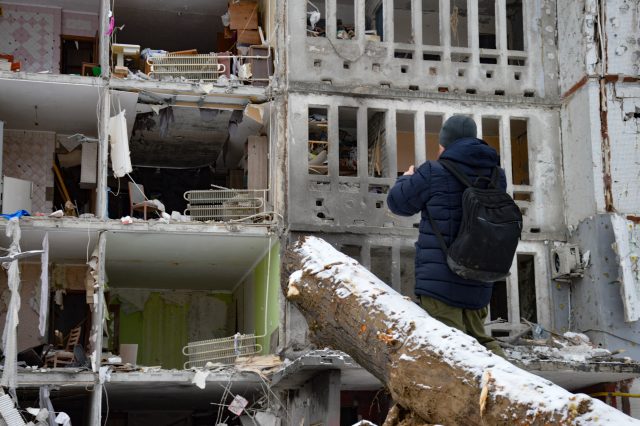Executive summary compiled by Nataliya Zubar
Acoustic terror is a component of terrorist tactics used by the Russian Federation in the war against Ukraine. We, the researchers of the non-government non-profit organization Maidan Monitoring Information Center, introduced the concept of “acoustic terror” in 2022 as an outcome of continuous monitoring of the traumatic war experience of our participants and volunteers from the two largest cities of Ukraine, Kharkiv and Kyiv. Supported by the Konrad Adenauer Foundation, we conducted a sociological study in the city of Kharkiv, which is located 30 kilometers from the state border between Ukraine and the Russian Federation. During the research, the Russian army systematically bombarded Kharkiv, during the day and night, using aircraft, bombs, missiles, combat drones, which generate intense “sounds of war” that traumatize people with shock and sound waves, as well as a number of secondary factors of psychological damage, among which we especially highlight chronic sleep disorders.
To research acoustic terror and its impact on the civilian population, in October 2023 we interviewed 489 people via a pilot online survey, based on the results of which, in December 2023 – February 2024, we conducted 31 in-depth focused interviews with representatives of different categories of Kharkiv city community, including volunteers and doctors.
Our research revealed the impact of acoustic terror, which can affect the entire population of the city that is under permanent fire from Russia. Local authorities estimate that at the time of the research at least 1,200,000 people lived in the city.
We differentiated the “sounds of war” in Kharkiv and performed a sociological measurement of their psychological perception.
We established the fact that the civilian population was traumatized by the “sounds of war”, which cause suffering and negative impact on people’s health. We suggest distinguishing the main components in the mechanism of such impact as shock wave trauma and sound wave damage. As derivative factors of injury, we highlight negative social and media influence on mass consciousness; and destructive autosuggestion through personal experiences and fear projections.
Trauma can be acute, if either a person was in the immediate vicinity of the epicenter of the explosion, or chronic due to the systematic perception by sound receptors of the “sounds of war”, potentiated by a flood of information about destruction, death, injury, human grief and disaster. Acute and chronic injuries suffered by a person lead to a decrease in the quality of life, can cause new and aggravate existing diseases. Acute and chronic injuries suffered by a person lead to a decrease in the quality of life, can cause new and aggravate existing diseases.
We put forward a hypothesis about the following dynamics of the development of chronic stress in a large number of people due to the presence of powerful factors that can affect the entire population of the city under fire.
1) Acute stress, disorientation, panic states that occur in people who were near the explosions of powerful warheads of missiles, bombs, explosive devices, and felt the traumatic effect of the shock wave;
2) Repeated injuries from “sounds of war”;
3) Secondary influences of information, awareness of the scale of damage and destruction from shelling, exacerbated by general wartime tension and uncertainty about the future.
In the state of chronic stress, in which we assume that the majority of Kharkiv residents are, the “projection syndrome”, which was witnessed by the absolute majority of the respondents, is remarkable.
We define “projection syndrome” as the phenomenon when people associate household or industrial sounds with “sounds of war”, most often with missile and bomb strikes or airplanes and drones flights. “Projection syndrome” is a specific manifestation of chronic stress caused by the “sounds of war”.
We have identified specific sleep disorders caused by the nighttime shelling of the city. Disturbances in night sleep increase the chronic stress and can exacerbate chronic diseases and mood disorders.
Acoustic terror has all the features of a crime according to Article 258 of the Criminal Code of Ukraine “Act of Terror”. These features are: 1) committing generally dangerous acts; 2) public performance with an objective to cause a wide resonance; 3) intentional infliction of fear and tension in society, aimed at intimidating the population; 4) blackmailing the authorities by the suffering of the civilian population; 5) mass visibility; 6) wide spread in time and space. Article 258 of the Criminal Code includes a sufficient amount of qualifying features to prosecute the aggressor for committing terrorist acts; however, we want to create a methodology for proving the crime of mass terror in the form of acoustic violence against civilians.
Those guilty of human suffering must be recognized as criminals and punished in Ukrainian courts, and in those future international courts or tribunals that must establish responsibility for crimes committed by the Russian Federation in Ukraine. The results of our research can contribute to the creation of an evidence base.
Civilian doctors, life support and emergency workers, volunteers are and will been exposed to acoustic terror in Kharkiv in the future, they will not leave the city. They need professional help immediately.
To mitigate the impact of acoustic terror, primarily sleep disorders, we propose to use the results of our research as a foundation for the interdisciplinary international scientific group. The group could design a methodology for measuring the physiological and neurophysiological consequences of acoustic terror, develop protocols to improve the health and life condition of the victims and the methodology for evaluating the effectiveness of such actions. The research can also become part of the forensic methodology for proving the crime of mass acoustic terror.
References:
Acoustic terror of the Russian Federation (07-07-2022)
Results of the pilot sociological study “Sounds of War” (31-10-2023) in Ukrainian
Acoustic terror in the context of the Russian-Ukrainian war: a sociological dimension. (19-04-2024) in Ukrainian





